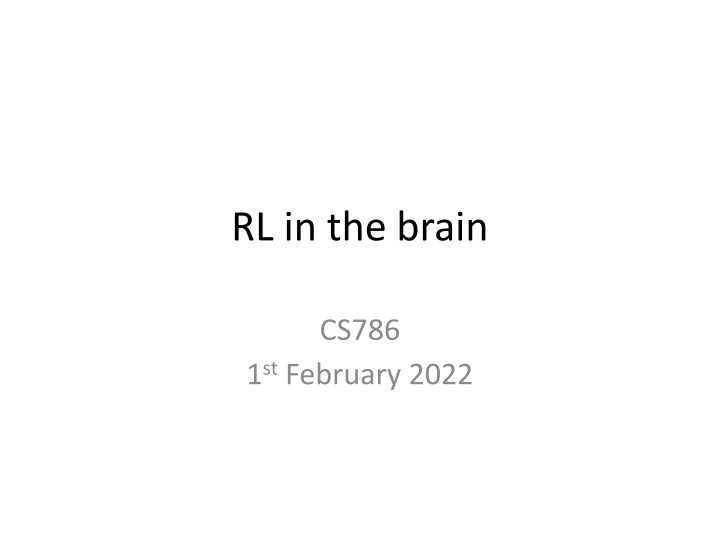
Reward Prediction Errors in Behavioral Learning
Explore the concept of reward prediction errors in temporal difference learning, with insights into the role of future expectations and the mechanics of physical addiction in cocaine dependency. Delve into the principles of Q-learning, SARSA updates, and the Bush Mosteller algorithm to grasp how behavioral reinforcement operates through TD learning.
Download Presentation

Please find below an Image/Link to download the presentation.
The content on the website is provided AS IS for your information and personal use only. It may not be sold, licensed, or shared on other websites without obtaining consent from the author. If you encounter any issues during the download, it is possible that the publisher has removed the file from their server.
You are allowed to download the files provided on this website for personal or commercial use, subject to the condition that they are used lawfully. All files are the property of their respective owners.
The content on the website is provided AS IS for your information and personal use only. It may not be sold, licensed, or shared on other websites without obtaining consent from the author.
E N D
Presentation Transcript
RL in the brain CS786 1st February 2022
Temporal difference learning Consider the Q-learning update Or the SARSA update A generic temporal difference principle can be discerned for behavioral reinforcement
The TD learning principle Bush Mosteller algorithm, with V as learned reinforcement value Temporal difference learning Discounted future rewards not available instantaneously Use Bellman optimality principle
Reinterpreting the learning gradient In Bush Mosteller, the reward prediction error is driven by the difference between A discounted average of received rewards The current reward In TD learning, RPE is the difference between Expected value of discounted future rewards F Information suggesting the expectation is mistaken http://www.scholarpedia.org/article/Temporal_difference_learning
The TD reward prediction error Learning continues until reward expectations are perfectly aligned with received reward
The role of the future Myopic learning ( = 0) Future-sensitive learning ( > 0)
Cocaine addiction (a success story) Cocaine pharmacodynamics Is a dopamine reuptake inhibitor Under normal circumstances the TD signal is ( 1 t t t r V s + = + ) ( ) V s + 1 t When you take cocaine ( ) ( ) = + V s + max , r V s D D + + 1 1 t t t t t t
The mechanics of physical addiction In the beginning, taking cocaine is associated with positive TD signal So taking cocaine is learned But presence of cocaine in the system prevents the TD signal from becoming negative No matter what you do Behavior cannot be unlearned!
Reward insensitivity Observer will become unable to tradeoff drug consumption with other rewards
Cost insensitivity Observe is unable to reduce preference with increasing cost
Cocaine addiction (a success story) Cocaine pharmacodynamics Is a dopamine reuptake inhibitor Under normal circumstances the TD signal is ( 1 t t t r V s + = + ) ( ) V s + 1 t When you take cocaine ( ) ( ) = + V s + max , r V s D D + + 1 1 t t t t t t Addiction: a computational process gone awry (Redish, 2004)
The model free vs model-based debate Model free learning actions that lead to rewards become more preferable What about goal-based decision-making? Do animals not learn the physics of the world in making decisions? Model-based learning People have argued for two systems Thinking fast and slow (Balleine & O Doherty, 2010)
A clever experiment The Daw task (Daw et al, 2011) is a two-stage Markov decision task Differentiates model-based and model-free accounts empirically
Predictions meet data Behavior appears to be a mix of both strategies What does this mean? Active area of research
